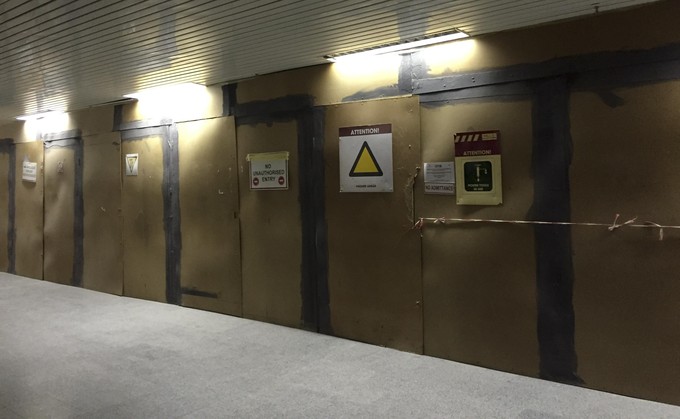
Access to some of the floors in the Botha Sigcau Building is cordoned off. Photo: Raphael Chaskalson
6 April 2016
I recently spent several weeks doing research in the Eastern Cape for a Masters dissertation. The research is centred on a land claim involving some 900 households and their descendants, who in the early 1980s were forcefully removed off 12,000 hectares of land in the former Transkei to make way for a sugar plantation.
Although most of the research involved interviews and observation, I travelled to Mthatha to look for records from the former Transkei relevant to the project.
I’d been told by various researchers that there are serious issues with record keeping in the former Transkei. Until about 1963 (when the Transkei was granted ‘self-government’), archives are reasonably well kept and catalogued in a public library in the town’s centre. But records from after that date, I was told, are stored in the Botha Sigcau Building - now the regional seat of government in central Mthatha, named after an early 20th century paramount chief.
An advocate who worked on another land claim told me that these records were kept in a strongroom on the second floor when she was last there, almost three years ago, locked up, uncatalogued, in boxes piled up to the roof. She said some staff in the building were aware of the importance of the documents and were reluctant to let her into the room. She warned that I might have trouble accessing what I needed.
The Botha Sigcau Building is right in the centre of Mthatha and is the tallest in the town, with 11 floors. Several government departments, including the local deeds office, department of education and traditional affairs, have their offices in the building.
In general, the state of the building is appalling. When I visited, only one out of six lifts were working, most of the corridors had no working lights, the stairwell stank of urine and was littered with cigarette butts. In various places, the roof and walls were falling apart. These are hardly optimum conditions for running the regional seat of government, and I can only imagine how these working conditions affect the staff who work in the building.
When I entered the building, the receptionist in the lobby did not know about the records I was searching for. I ascended the stairs and, to my surprise, the second floor was inaccessible - the entrance to the corridor was bolted shut, with various signs warning the public of dangerous construction.
I then spent a few hours walking around every floor, asking various people if they knew where these records were. No one did. In the traditional affairs department, a member of staff informed me that a few weeks ago, a recycling team had been dispatched to clear the building of old papers, and the records might have been disposed of there.
I left the building empty-handed. Since at least some officials know the importance of these records, I suspect that they were either moved somewhere, or are still lying in a dark corner of the building. Of course, it is possible that they have been lost or destroyed.
The point of this article is not to embarrass the staff who work in the building. Most of them probably aren’t responsible for losing these records or, for the appalling state of the building, and I can only imagine how difficult and demoralising it is to work in the place like that.
My experience in Botha Sigcau has few consequences for me other than the omission of some sources for my project.
But for others, the cost of losing these historical documents is anything but trivial. Recently, Verne Harris was interviewed in the Mail and Guardian, where he shared his concerns at the state of our archives. Now that President Jacob Zuma has re-opened the land claims process, these records are invaluable.
The head of the Land Claims Commission in the Eastern Cape, Zukile Pityi, told me that there are more than 12,000 new claims in the Eastern Cape alone - and more than 100,000 nationally. Without being able to access essential records from the apartheid era - such as title deeds, records of transactions, and permission-to-occupy certificates - it is simply impossible for claims to be settled.
Of the 12,000 new claimants in the Eastern Cape, those who are lucky enough to have their cases heard risk being critically hamstrung by the inability of their lawyers to find important records. And without these documents, in cases of conflict over land claims, all judges will have to rely on is the word of one party against another - hardly an ideal or fair way to settle something as sensitive as a land claim.
Harris points out that, with the socio-economic challenges government faces in South Africa, it is perhaps understandable that the state of our archives doesn’t seem to be a top priority. However, with thousands of new land claims set to come to court over the next few decades, accurate record-keeping has never been more important in South Africa. It is likely that a large percentage of these claims will be in the former homelands, where many forced removals took place.
We can only hope that the records in Botha Sigcau still exist and that, somewhere in the higher echelons of provincial government, the powers that be are waking up to the fact that history matters.
Raphael Chaskalson is a Masters Student in Economic and Social History at the University of Oxford. His current research is centred on a land claim in Mpondoland, and what has occurred since it was settled in 2009. His twitter handle is @raphc47.
Views expressed are not necessarily those of GroundUp.